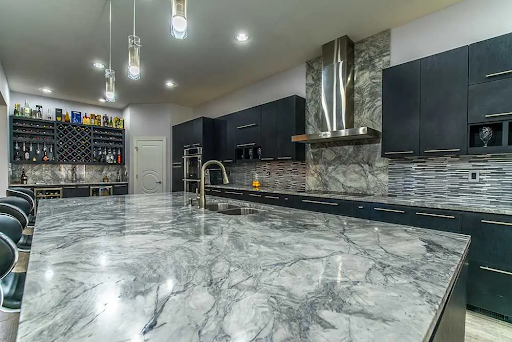
Marble countertops, or marble worktops, are a luxurious addition to any home, known for their timeless beauty, elegance, and natural charm. However, marble is a delicate material that requires proper maintenance and care to retain its pristine condition. In this comprehensive guide, we will explore the best practices to maintain and care for your marble countertops, ensuring they continue to shine for years to come.
1. Sealing Your Marble Countertops
One of the most important steps in caring for marble countertops is sealing them. Marble is a porous material, meaning it can absorb liquids like water, wine, coffee, and oil, leading to potential staining. To prevent this, it’s crucial to apply a high-quality sealant to your marble worktops after installation. Typically, a marble countertop should be sealed every 6-12 months, but this depends on the level of use and exposure to liquids.
A simple test to check if your marble is properly sealed is to apply a few drops of water on the surface. If the water absorbs and leaves a darker spot, it’s time to reseal your countertops.
2. Cleaning Your Marble Countertops Properly
When it comes to cleaning marble countertops, it’s essential to avoid harsh chemicals that can damage the surface. Instead, use a gentle, pH-balanced cleaner or a mixture of warm water and mild dish soap. A soft cloth or sponge should be used to wipe down the surface, ensuring you don’t scratch the marble.
Avoid using abrasive pads or scrubbing brushes that can leave marks on your marble countertops. Also, make sure to wipe up any spills promptly, especially acidic substances like lemon juice, vinegar, or tomato sauce, which can etch or dull the surface.
3. Preventing Scratches and Damage
While marble countertops are durable, they are not indestructible. To prevent scratches and damage, always use cutting boards when preparing food, as knives can easily leave marks on the surface. Marble worktops can also chip or crack under heavy impact, so be cautious when placing heavy objects on the countertops.
Using trivets or heat pads under hot pots and pans is essential to prevent heat damage. Marble can be sensitive to extreme temperatures, and placing a hot pan directly on the surface may cause it to crack or discolor.
4. Removing Stains from Marble Countertops
Despite being sealed, marble countertops can still develop stains over time. To address this, it’s important to identify the type of stain first. For oil-based stains (e.g., grease or cooking oils), sprinkle baking soda on the affected area and cover it with plastic wrap. Leave it for a few hours or overnight, then wipe away the paste and rinse the area.
For water-based stains (e.g., coffee or wine), mix a paste of baking soda and water, and apply it to the stain. Let it sit for a few hours before wiping it away. If the stains persist, you may need to consult a professional to avoid damaging the surface further.
5. Polishing and Restoring the Shine
Over time, marble countertops can lose some of their natural luster. To restore the shine, use a marble polishing powder or a specially formulated marble polish. These products can help revive the countertop’s finish and bring back its beautiful sheen.
Be sure to follow the manufacturer’s instructions when using any polishing product, as improper application can lead to damage. If you’re unsure or prefer a professional touch, consider hiring a stone care specialist for refinishing services.
Conclusion
While marble countertops are undeniably stunning and sophisticated, they do require some effort to maintain their beauty. If you’re looking for a low-maintenance alternative, quartz countertops are an excellent choice. Unlike marble, quartz is non-porous and highly resistant to staining, making it easier to care for. It’s also more durable and less prone to scratching or etching, offering a long-lasting surface with minimal upkeep. Whether you choose marble or quartz countertops, each material has its unique benefits, and understanding how to care for them will help ensure your countertops remain beautiful and functional for years to come.




